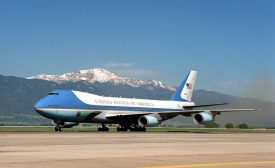Donald Trump
One way for North Americans to transcend the ugliness of politics and assert a shared identity would be by hosting a World Cup together. The 2026 World Cup is the next one to be awarded, and the North American region is a strong contender, given the tournament’s traditional rotation among continents. Both Mexico and the U.S. are expected to submit compelling bids.
Following 9/11, there has been a growing recognition in the Pentagon that the "soft power" of overseas aid helps in the fight against extremism. If America is seen to be indifferent to, say, the Ebola crisis or a huge earthquake, it can act as a recruiting sergeant for radical groups. There are some signs that Mr Trump might be persuaded by this argument; that aid and security go hand-in-hand.
Last week, an amendment buried deep in the text of the National Defense Authorization Act disbanded the bipartisan Broadcasting Board of Governors (BBG), putting in its place an executive directly appointed by the president of the United States. The idea of handing control of the agency to Donald Trump has left some in the media reeling: Politico wrote this week, “Trump is finally getting his Trump TV—financed by taxpayers to the tune of $800 million per year.”
As President-elect Donald Trump continues making his picks of US officials, including the controversial announcement on Friday of Ambassador to Israel David Friedman, his upset poll victory is still sending shock waves around the world. [...] The continued shock at Trump’s election, and some of his early decisions and appointments, threatens to potentially damage the reputation of the United States (so-called ‘Brand America’) internationally.
In a world that is so tightly interconnected by social media and technology, it is imperative that we take advantage of our robust lines of communication [...] With the uncertainty of our U.S. foreign policy in the face of a new administration, now is a critical time for public diplomacy. The more we connect directly and listen to individuals from other countries, the more likely we are to understand society

Markos Kounalakis speculates on where President Trump will travel first.
The election of Donald Trump to the U.S. presidency is continuing to send shockwaves in the corridors of power across East Asia. Yet even before the results of the 2016 US elections became known, the tremors of political change in the region were already evident. Arguably, the U.S. president-elect has only added fuel to the fire of America’s relations with East Asia.







